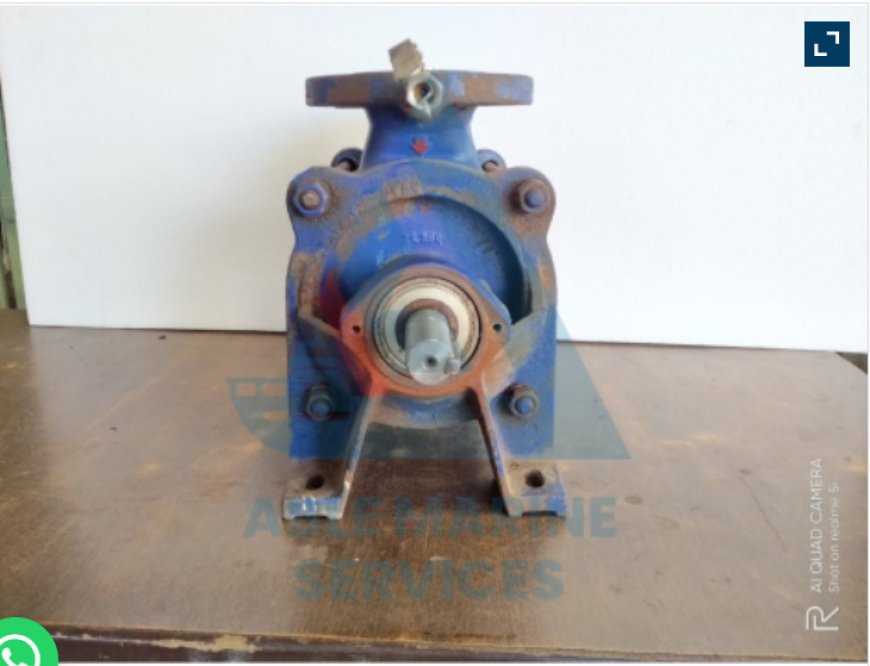Understanding Marine Equipment and Auxiliary Engine Spares: A Comprehensive Guide
The maritime industry is a cornerstone of global trade, responsible for transporting goods across the world's oceans.

The maritime industry is a cornerstone of global trade, responsible for transporting goods across the world's oceans. At the heart of this industry lies marine equipment and auxiliary engine spares, which play a crucial role in ensuring the smooth operation and safety of vessels. This blog delves into the importance, types, and sourcing of marine equipment and auxiliary engine spares, providing valuable insights for shipowners, operators, and maritime professionals.
Importance of Marine Equipment and Auxiliary Engine Spares
Marine equipment and auxiliary engine spares are essential for the day-to-day operation of ships. These components ensure that all onboard systems function optimally, from propulsion and power generation to navigation and safety systems. The reliability of these parts is critical, as any failure can lead to significant downtime, costly repairs, and even dangerous situations at sea.
The importance of having high-quality marine equipment cannot be overstated. Whether it's the main engine, auxiliary engines, or other vital systems, each component must be meticulously maintained and regularly replaced with genuine spares to prevent unexpected breakdowns. Shipowners and operators need to have a well-established supply chain to source these parts efficiently, ensuring that their vessels remain seaworthy and compliant with international regulations.
Types of Marine Equipment
Marine equipment encompasses a wide range of components that are essential for the operation and safety of a vessel. Some of the most critical types of marine equipment include:
-
Propulsion Systems: These include the main engines, propellers, and thrusters that enable a ship to move through the water. Regular maintenance and timely replacement of worn-out parts are crucial for optimal performance.
-
Navigation Systems: From radar and GPS to compasses and autopilots, navigation systems are vital for safe and efficient voyages. Ensuring that these systems are always in working order is a top priority for shipowners.
-
Safety Equipment: Lifeboats, life rafts, fire extinguishers, and other safety gear are mandatory on all vessels. Regular inspections and replacement of expired or damaged equipment are necessary to comply with safety regulations.
-
Electrical Systems: Power generation and distribution systems, including generators, transformers, and switchboards, are essential for running various onboard systems. Reliable electrical components are crucial for maintaining a vessel's operational readiness.
-
Hydraulic and Pneumatic Systems: These systems control various onboard machinery, including cranes, winches, and steering gear. Proper maintenance and the use of high-quality spares are necessary to ensure smooth operation.
Auxiliary Engine Spares: A Closer Look
Auxiliary engines, also known as gensets (generator sets), are secondary engines used on ships to generate electricity for various onboard systems. These engines are critical for maintaining power supply when the main engine is not in operation, such as when a vessel is in port or during low-speed maneuvers.
Auxiliary engine spares are essential for keeping these engines in good working condition. Some of the most commonly used auxiliary engine spares include:
-
Cylinder Liners and Pistons: These components are subject to high levels of wear and tear due to the intense pressure and heat generated within the engine. Regular inspection and replacement are necessary to prevent engine failure.
-
Fuel Injection Pumps and Nozzles: These parts are responsible for delivering the correct amount of fuel to the engine's cylinders. Any malfunction can lead to poor engine performance and increased fuel consumption.
-
Cooling and Lubrication Systems: Auxiliary engines require effective cooling and lubrication to prevent overheating and reduce friction. Components such as pumps, filters, and coolers must be regularly maintained and replaced as needed.
-
Exhaust Systems: Exhaust valves, manifolds, and turbochargers are critical for managing engine emissions and ensuring efficient operation. Proper maintenance of these components is essential for compliance with environmental regulations.
Sourcing Marine Equipment and Auxiliary Engine Spares
Sourcing high-quality marine equipment and auxiliary engine spares is a critical aspect of ship maintenance and operation. The maritime industry relies on a global network of suppliers, manufacturers, and distributors to provide the necessary parts and components.
When sourcing marine equipment and spares, it's essential to consider the following factors:
-
Quality Assurance: Always source parts from reputable suppliers who can provide certification and documentation proving the quality and authenticity of their products. Using counterfeit or substandard parts can lead to significant risks and liabilities.
-
Availability: The availability of spares is crucial, especially in emergencies. Working with suppliers who maintain large inventories and can deliver parts quickly is essential for minimizing downtime.
-
Cost-Effectiveness: While cost is always a consideration, it's important not to compromise on quality. Investing in genuine, high-quality spares may have a higher upfront cost, but it can save money in the long run by preventing costly breakdowns and repairs.
-
After-Sales Support: Choose suppliers who offer robust after-sales support, including technical assistance, warranty services, and maintenance advice. This support can be invaluable in ensuring the smooth operation of your vessel.
Conclusion
Marine equipment and auxiliary engine spares are the backbone of the maritime industry, ensuring that vessels operate safely and efficiently. By understanding the importance of these components, recognizing the various types available, and sourcing them from reputable suppliers, shipowners and operators can significantly enhance the reliability and longevity of their vessels. Investing in quality marine equipment and spares is not just a necessity—it's a commitment to the safety and success of maritime operations.
What's Your Reaction?














![Noots Focus Reviews [Truth Exposed 2025]!](https://news.bangboxonline.com/uploads/images/202501/image_430x256_678e3b94881a1.jpg)
![Vivalis Male Enhancement: The Must-Know Ingredients [2025 Update]](https://news.bangboxonline.com/uploads/images/202501/image_430x256_678e3b54e396c.jpg)









